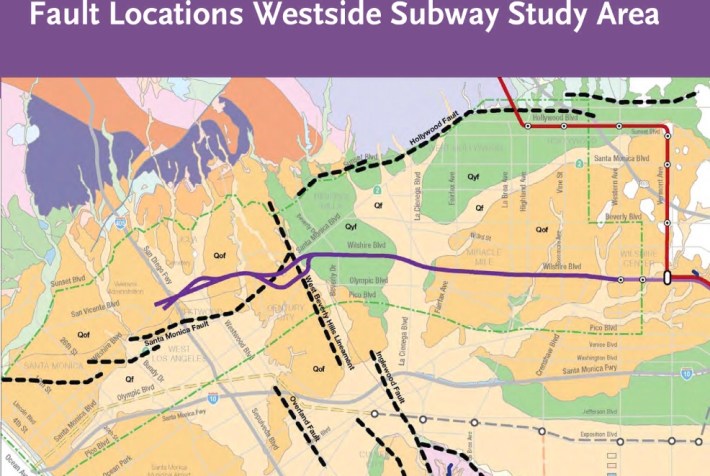(Steve Hymon reviews the geology and presentation from a scientific standpoint at The Source. I'm considering this an unofficial companion piece looking at how today's presentation changes the politics. Angelenos Against Gridlock were also updating their website throughout the presentation. - DN)
Earlier this afternoon, the Metro Board of Directors Planning Committee held a wake for the Westside Subway Station at Santa Monica Boulevard. The Station had been on life support for some time now, but the testimony of two teams of geologists finally put the beleaguered proposal to rest.
Testifying that a station anywhere along Santa Monica Boulevard would be dangerous because it would lie in an active fault zone, Dr. James Dolan of USC, Dr. Lucy Jones of the U.S. Geological Survey and the California Institute of Technology, Dr. Harvey Parker, an engineer and former President of the International Tunneling Association, and Dr. Paul C. Jennings, a Professor of Civil Engineering and Applied Mechanics, Emeritus, at the California Institute of Technology all agreed that it would be irresponsible for Metro to build a station along Santa Monica Boulevard. Their studies also showed that a station at Constellation Avenue and Avenue of the Stars would fall outside active fault zones.
According to these experts, the best route for the Subway is underneath the south wing of Building B of the Beverly Hills High School. The experts all agreed that there is no reason to believe that the deep trench tunnel, running 70 feet underground, will endanger students or any planned development for the high school including an underground parking garage.
Despite the well funded organizations that have longed pushed for a subway stop on Santa Monica Boulevard (remember the "Century City Subway" website?), this should mark the end of the campaign for a Santa Monica Station. After all, even if the team hired by Beverly Hills Unified School District comes up with different conclusions than the pair of teams hired by Metro, it is wildly unlikely that Metro would every build a station at a location deemed unsafe by teams contracted for by Metro.
Thus, the political battle shifts from comparing the two station proposals to a focus on the process that has led to today's findings and whether or not the Constellation Avenue Station and route underneath Beverly Hills High School is appropriate and safe. The battle over process began immediately after the geologists presentation was completed.
Metro staff gave no advance information on today's presentation to anyone, Metro Board included, leaving Supervisor Mike Antonovich annoyed that he wasn't prepared for a robust question and answer session with the presenters. He compared the process to a "professional wrestling match" with a predetermined outcome and called the process "flawed from the beginning."
Supervisor Zev Yaroslavsky, who's district includes Beverly Hills, and Santa Monica City Council Woman Pam O'Connor both defended the process noting today was just an oral presentation and no decisions would be made by the Board until there was much deeper review, more public hearings, and a formal presentation to the Planning Committee and Full Metro Board of Directors.
Which is probably a good thing. Despite being the Board Member most prepared to quiz the presenters, Yaroslavsky stumbled at times reminding the presenters that he, and most of the people in the room, were laymen on earthquakes and geology. Later, he had trouble remembering what some of the lines on the geological maps meant. This isn't to pick on Yaroslavsky, just to point out that while the presenters, especially Dolan and Jones, did an admirable job translating science to English, the presentation was still technical and dense. It's going to be sometime before the Board can get in to all the details.
Also questioning the politics and methodology of today's announcement was the Beverly Hills Unified School District which released a scathing statement wondering why Metro hasn't released all of the data for the project as it became available and demanding their experts have a chance to review everything:
With its seismic data presentation, Metro has opened a veritable Pandora’s Box that potentially impacts many dozens of existing buildings and future projects in the region, including Beverly Hills High School, future station locations for the Westside Subway Extension as well as currently entitled development projects. It is unfathomable that Metro has had this important seismic data available for such a long time without providing it to the BHUSD or other interested parties in the purported earthquake zone.
Much of the data presented today has been available for almost a year. The fact that Metro held it for so long poses many questions that Metro cannot answer. If the fault is so dangerous, the information should have been more forthcoming. We urge Metro to fully disclose all of the data as soon as possible. Our independent experts will immediately begin evaluating the findings and will weigh in as this process moves forward.
While the BHUSD readies their rebuttal, it's hard to picture an outcome where a station is constructed on Santa Monica Boulevard at any time in the near future leaving BHUSD with two options: arguing that the Constellation Avenue Station is also dangerous and Metro needs to go back to the drawing board for a stop for the area or that the Westside Subway should just skip this area and head right from La Cienega Beverly/Rodeo Drive to Westwood.
Today's presentation will be available on Metro.net/westsidesubway later today or tomorrow morning.






